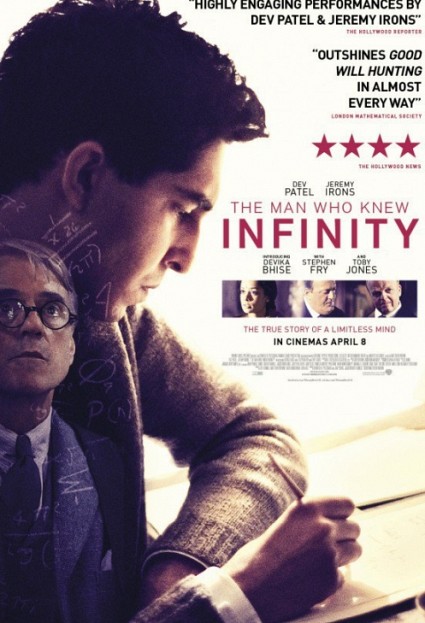
Behindwoods.com isn't responsible for the views expressed by the visitor in this column. The visitor claims that this column is his/her own. If the column infringes any copyrights that you hold, please email us at columns@behindwoods.com.
The Man Who Knew Infinity is the story of Srinivasa Ramanujan, the genius mathematician, who was famously an autodidact, produced more than 3900 identities and equations during his short life. While working as a lowly clerk at the Madras Port Trust, he contacted professor G H Hardy at Trinity College, London by writing him a letter with various formulas specifically relating to infinite series. After some initial trepidation, Hardy invited him to Trinity College for a fellowship. The rest of the movie focuses on Ramanujan’s life in London, how he struggled to adjust to the separation from his wife, weather, food, racism and most importantly working style of Hardy. We do see glimpses of life back home where his mother and wife who while eagerly waiting for his return also wish him to earn recognition for his work. There is some drama due to the typical mother-in-law/daughter-in-law dynamic, which brews up storms of misunderstandings in the family. The bulk of the film focuses on how Hardy, an atheist, and a firm believer in mathematical proofs, come to believe in the intuition of Ramanujan that is the source of his creativity, and the unlikely bond that forms between them. The rampant racism (more like nonchalant dismissal) and the deep mistrust of the uneducated ‘charlatan’ among the faculty and the board takes more time to overcome, but Prof. Hardy and Prof. Littlewood champion Ramanujan’s cause, and by pushing Ramanujan to produce proofs for his intuitive theorems finally make the college board see their way, and Ramanujan gets to publish some of his work, and earns the FRS (Royal Fellowship) and the fellowship of Trinity College. Unfortunately, he contracts tuberculosis during his time in London and returns to India only to die soon after at the young age of 32. Most of his work has been proven right long after his death by other mathematicians, only to indicate that he was years ahead in his insight and brilliance.
The eternal conflict between the esoteric and scientific forms the crux of the movie. At one point in the film, Ramanujan says to Hardy, “do you want know how I get my ideas? I meditate on a problem, and God speaks to me”, as hard as it is to believe, Hardy becomes a believer in Ramanujan, if not God and proclaims in front of the Royal Society, “if we accept nature is God, who are we to question Ramanujan, who are we to question God?”. I personally tried to equate ancient Indian rishis to theoretical physicists like Einstein who were able to intuitively produce theories and equations on complex nature of things.
Dev Patel as Ramanujan does a great job of portraying the shy, introvert Ramanujan, and Jeremy Irons as professor G H Hardy is amazing. The rest of the cast just fades away with Patel and Irons running the show. Writer/Director Matt Brown captures the essence of Ramanujan’s life in India and London, by keeping the film’s running time to a crisp 108 minutes. What many people may not realize is that one of the associate producers for the film is Manjul Bhargava (Canadian Indian math whiz, and recipient of Fields Medal, if you haven’t heard of Manjul Bhargava yet, please look him up). Though the visuals of India and England do set the mood, the director takes a minimalist approach to the film, focusing on the melodrama and a bit of math. Given the propensity of Hollywood to oversimplify complex things (case in point: the game theory scene from A Beautiful Mind), this film does a great job in explaining Ramanujan’s work on partitions.
Even most of Indians have very little clue about Ramanujan except that he was a genius, so this is a must watch for Indians and of course everyone around the world.
bhaskar.gandavabi@gmail.com
Please send your column to columns@behindwoods.com.









